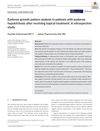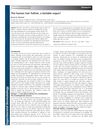 137 citations,
January 2000 in “Skin Pharmacology and Physiology”
137 citations,
January 2000 in “Skin Pharmacology and Physiology” The document recommends using both clinical evaluation and various measurement methods to assess skin greasiness, considering factors like temperature and hormones.
 6 citations,
November 1997 in “International Journal of Dermatology”
6 citations,
November 1997 in “International Journal of Dermatology” Women with acne and irregular periods had higher active testosterone levels, which could suggest the usefulness of antiandrogen treatment.
 37 citations,
January 1997 in “Clinics in Dermatology”
37 citations,
January 1997 in “Clinics in Dermatology” Hair problems are common and distressing for women, but increasing knowledge of treatments offers hope.
 46 citations,
September 2016 in “Clinical, Cosmetic and Investigational Dermatology”
46 citations,
September 2016 in “Clinical, Cosmetic and Investigational Dermatology” Hormonal treatments are effective for severe or persistent acne and should be used with other acne therapies, considering potential side effects.
 4 citations,
September 2019 in “Journal of cosmetic dermatology”
4 citations,
September 2019 in “Journal of cosmetic dermatology” Topical bimatoprost 0.01% improves eyebrow density and diameter, especially at the tail.
 18 citations,
June 2019 in “Clinical research in dermatology”
18 citations,
June 2019 in “Clinical research in dermatology” Acne can't be cured but can be managed with treatments like benzoyl peroxide and diet changes; it's costly and can lead to scarring and mental health issues.
 11 citations,
December 2014 in “Clinical Obstetrics and Gynecology”
11 citations,
December 2014 in “Clinical Obstetrics and Gynecology” Obstetrician/gynecologists can diagnose and manage female hair loss with careful history taking and examination.
 1 citations,
March 2023 in “Nutrients”
1 citations,
March 2023 in “Nutrients” The conclusion is that obesity should be managed with a slow, balanced approach to diet and exercise, with medication and surgery as additional options, and education and access to care are important.
5 citations,
June 1995 in “Comparative biochemistry and physiology. Part C. Comparative pharmacology and toxicology/Comparative biochemistry and physiology. C. Comparative pharmacology and toxicology” Removing mink's adrenal glands causes their summer fur to grow earlier.
 47 citations,
May 2012 in “Wiley Interdisciplinary Reviews-Developmental Biology”
47 citations,
May 2012 in “Wiley Interdisciplinary Reviews-Developmental Biology” The conclusion is that understanding how feathers and hairs pattern can help in developing hair regeneration treatments.
 May 2024 in “International Journal of Advanced Academic Studies”
May 2024 in “International Journal of Advanced Academic Studies” Vitamin E helps reduce PCOS symptoms and improves hormonal balance.
 15 citations,
June 2020 in “Experimental Dermatology”
15 citations,
June 2020 in “Experimental Dermatology” Hormones and genes affect hair growth and male baldness.
 7 citations,
March 2016 in “Journal of Cosmetic and Laser Therapy”
7 citations,
March 2016 in “Journal of Cosmetic and Laser Therapy” Home-use lasers and IPL devices are unlikely to directly cause paradoxical hair growth; it may be linked to inflammation or hormonal issues.
 June 1998 in “Biomedicine & Pharmacotherapy”
June 1998 in “Biomedicine & Pharmacotherapy” Medical treatments like chemotherapy and radiotherapy can harm sperm production, so freezing sperm before treatment is important for men who want children later.
 30 citations,
February 2003 in “Annals of Neurology”
30 citations,
February 2003 in “Annals of Neurology” Progesterone and related compounds may help control seizures linked to the menstrual cycle but have limitations that need addressing.
 November 2023 in “International journal of biology, pharmacy and allied sciences”
November 2023 in “International journal of biology, pharmacy and allied sciences” Herbal treatments can help with hair problems, but more research is needed.
6 citations,
January 2023 in “Evidence-based Complementary and Alternative Medicine” Combining yoga and certain herbs can effectively manage PCOS symptoms and improve quality of life.
 35 citations,
January 2014 in “BioMed Research International”
35 citations,
January 2014 in “BioMed Research International” Female pattern hair loss involves hormonal factors, genetics, and may be linked to low ferritin levels.
 6 citations,
July 2003 in “Journal of Womens Health”
6 citations,
July 2003 in “Journal of Womens Health” Experts say proper treatment and sensitivity are important for women's facial skin issues like acne and unwanted hair.
 22 citations,
October 2018 in “British Journal of Haematology”
22 citations,
October 2018 in “British Journal of Haematology” Women have a higher risk of blood clots from hormonal factors and need careful treatment, especially during pregnancy.
December 2024 in “Journal of Clinical Medicine” PCOS and eating disorders are linked by hormonal imbalances, needing personalized treatment.
 4 citations,
May 2007 in “Oral and Maxillofacial Surgery Clinics of North America”
4 citations,
May 2007 in “Oral and Maxillofacial Surgery Clinics of North America” Understanding gender differences and individual patient characteristics is essential for optimal cosmetic surgery outcomes.
 February 2024 in “Endocrinology and Disorders”
February 2024 in “Endocrinology and Disorders” Balanced hormones are crucial for women's health, and can be managed with lifestyle changes or hormone therapy if needed.
 December 2024 in “Archiv Euromedica”
December 2024 in “Archiv Euromedica” Early diagnosis and personalized treatment are crucial for managing PCOS and preventing complications.
 3 citations,
April 2015 in “American journal of biomedical sciences”
3 citations,
April 2015 in “American journal of biomedical sciences” Androgens play a key role in hair growth and disorders like baldness and excessive hairiness.
 947 citations,
February 2004 in “The Journal of Clinical Endocrinology and Metabolism”
947 citations,
February 2004 in “The Journal of Clinical Endocrinology and Metabolism” Most women with excess male hormones have Polycystic Ovary Syndrome, and hormonal therapy can improve symptoms but may cause side effects.
 January 2008 in “Dermatology Online Journal”
January 2008 in “Dermatology Online Journal” Hormonal therapy like cyproterone acetate and spironolactone may help female hair loss, but more research is needed, especially for pre-menopausal women.
 45 citations,
January 2012 in “Experimental Dermatology”
45 citations,
January 2012 in “Experimental Dermatology” Human hair follicles switch between active and resting phases unpredictably.
 66 citations,
September 2008 in “Dermatologic therapy”
66 citations,
September 2008 in “Dermatologic therapy” The conclusion is that the best initial treatment for hirsutism is usually oral contraceptives, with the addition of antiandrogens or insulin sensitizers if needed, and topical eflornithine or laser treatments as supplementary options.
 11 citations,
April 2013 in “SpringerPlus”
11 citations,
April 2013 in “SpringerPlus” Human skin's melanocytes respond to light by changing shape, producing pigments and hormones, which may affect sleep patterns.



























